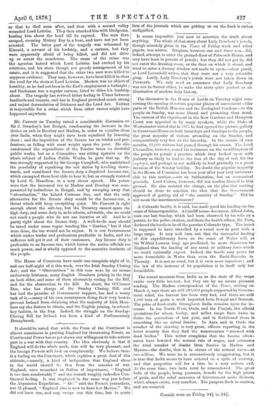Mr. Fawcett on Tuesday raised a considerable discussion on Sir
J. Strachey's last Budget, condemning the increase in the duties on salt in Bombay and Madras, in order to equalise them over India, when they might have been equalised by lowering them ; and the imposition of the licence tax on trades and pro- fessions, as falling with most weight upon the poor. He also condemned the expenditure of the Famine taxes on doubtful public works, but as a Committee was sitting upstairs on the whole subject of Indian Public Works, he gave that up. He was strongly supported by Sir George Campbell, who maintained the possibility of equalising the salt duties by levelling down- wards, and considered the licence duty a disguised Income-tax, which exempted those best able to bear it, but as strongly resisted by Lord G. Hamilton, in a very clever speech. His points were that the increased tax in Madras and Bombay was com- pensated by reductions in Bengal, and by sweeping away that " abomination," the Inland Customs line, and that the only -alternative for the licence duty would be the Income-tax, a threat which will keep everything quiet. Mr. Fawcett is right enough about the salt-tax, but the Treasury cannot spare the high duty, and some duty is, as he admits, advisable, else we could not reach a people who do not use luxuries at all. And he is partly right about the licence duty. A well-to-do man should be taxed under some vague heading like " Rentier," but if that were done, the tax would not be unjust. It is our Government which makes trades and professions profitable in India, and the sufferers will get it out of their customers. Any licence duty is preferable to an Income-tax, which leaves the native officials too much power, and is wholly opposed to the secretive instincts of the people.


































 Previous page
Previous page